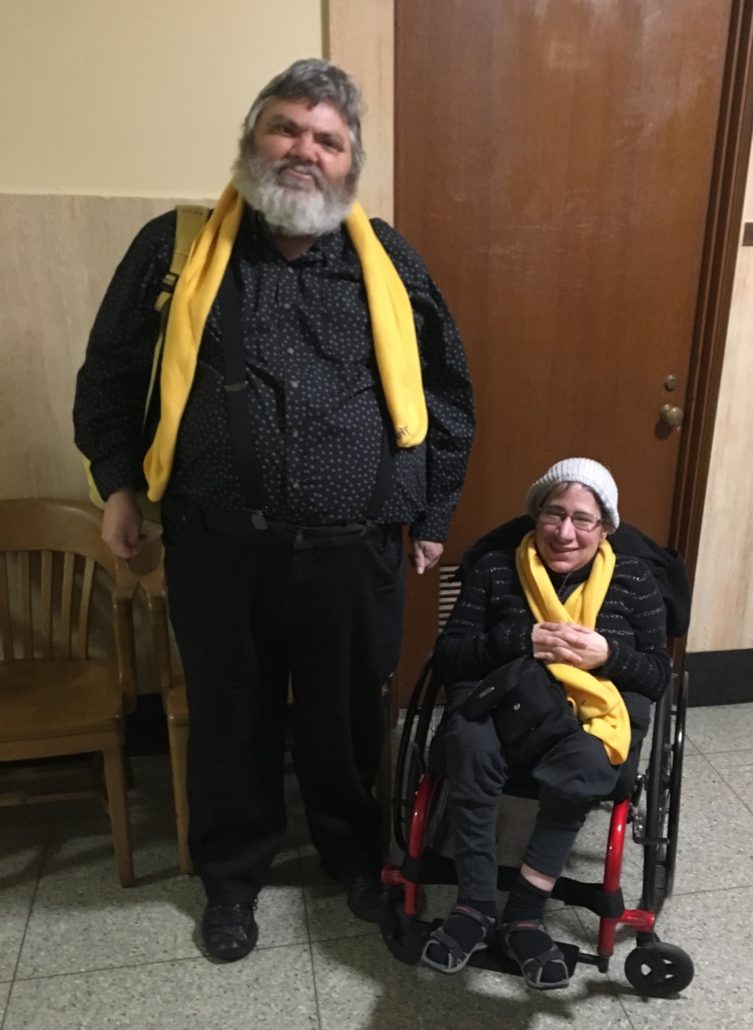MedStar Health Agrees to End Discriminatory Treatment of Patients With Disabilities in Federal Resolution
In a resolution that applies to all MedStar Health Inc. (“MedStar Health”) care locations in Washington, D.C., Maryland, and Virginia, MedStar Health has agreed to end its discriminatory treatment of patients with disabilities, including William King, a 73-year old man with communication-related disabilities, and to modify its policies to ensure patients with disabilities can access the in-person supports needed to communicate and have equal access to medical care during the COVID-19 pandemic.
In response to a federal disability discrimination complaint filed on September 16, 2020, by Disability Rights DC at University Legal Services (DRDC) together with CommunicationFIRST, the Center for Public Representation, The Arc of the United States, the Autistic Self Advocacy Network, the Civil Rights Education and Enforcement Center (CREEC), Quality Trust for Individuals with Disabilities, and the Washington Lawyers’ Committee for Civil Rights, the Office for Civil Rights (OCR) at the U.S. Department of Health and Human Services reached an agreement with MedStar Health to revise its no-visitor policies at all MedStar Health care locations to make clear that patients with disabilities who require support persons to communicate or otherwise access the programs and services of MedStar Health are entitled to access those in-person supports with appropriate coronavirus safety mitigation measures.
The District lacks clear, mandatory District-level guidance and policy to prevent discrimination against patients with disabilities. Instead, it has allowed health care entities like MedStar Health to set their own policies regarding in-person supports and other communication-related accommodations during the pandemic and gives these entities significant discretion to implement its policies. OCR’s resolution serves as a model for District-wide adoption.
MedStar also committed, in a separate resolution with Mr. King, to allow his support persons to accompany and stay with Mr. King at any MedStar Health care locations to ensure access to effective communication in his treatment consistent with MedStar Health’s revised policy.
The complaint alleged that MedStar Health discriminated against Mr. King in its implementation of its no-visitor policy by refusing to allow Mr. King’s support person to accompany him during his stay in the MedStar Washington Hospital Center and the MedStar National Rehabilitation Hospital and failing to provide technical auxiliary aids and services to ensure effective communication, in violation of federal law and subjecting Mr. King to serious risk of inadequate medical care, unnecessary physical and chemical restraints, and lasting emotional harm. With OCR’s leadership, the parties engaged in an Early Complaint Resolution process resulting in the agreement.
The new MedStar Health policy in part:
- Requires all MedStar Health care locations in the District of Columbia, Virginia, and Maryland to allow patients with disabilities to designate support persons to support them throughout their stay or visit at MedStar Health
- Recognizes that support persons may need to assist the patient with a disability regarding:
- Needs that are not visually apparent to someone who does not know them (e.g., discomfort, hunger, thirst, pain)
- Changes in their symptoms
- Needs related to a history of trauma
- Emotional self-regulation and anxiety management to prevent unnecessary use of physical and chemical restraints
- Acknowledges that MedStar Health has a continuing obligation during the pandemic to provide necessary aids and services and ensure effective communication and equal access to healthcare for patients with and without a support person.
“I am relieved that this is over and hope that MedStar will allow supporters for all people with disabilities that need them now that the policy has changed,” said Mr. King. “I filed this case because I wanted to help other people with disabilities so that no one has to go through what I went through. We are very thankful to everyone involved and to the hospital staff that helped me tremendously.”
“Our family was heartbroken that my father thought we left him in the hospital to die,” said Valerie Turnquist. “There are no words to express our deepest gratitude to Lyndsay Niles at DRDC, the other organizations who supported the case, and the Office for Civil Rights for expeditiously mediating a resolution. If your loved one has a disability, please ensure they have an advocate and do not ever stop fighting!”
“Even in our nation’s capital and surrounding areas, many with intellectual and developmental disabilities are being deprived of basic rights during the COVID-19 pandemic, and we have already seen dire consequences from this discriminatory treatment. We thank OCR for today’s resolution and will continue to fight for the health and well-being of all people with disabilities,” said Peter Berns, CEO, The Arc.
“We are incredibly pleased with the outcome and grateful that OCR moved quickly to ensure that MedStar Health adheres to the communication and health care rights of Mr. King and other people with disabilities who seek equitable treatment in their health care,” said DRDC Managing Attorney Lyndsay Niles. “COVID-19 has not created but exacerbated the need for disability justice to end discrimination for people with disabilities in health care and other spaces. This resolution is an important step to help prevent the injustice and harm Mr. King was subjected to from happening to other patients with disabilities in the future.”
“Demonstrating leadership once again, OCR in this second resolution on discriminatory hospital visitation policies during COVID, has made clear that health care providers must follow the Americans with Disabilities Act and other federal laws to ensure patients with disabilities can access the in-person supports they may need,” said Tauna Szymanski, Executive Director of CommunicationFIRST. “This resolution makes clear that patients with disabilities have the right to support people even in states like Virginia and the District of Columbia that have not yet adopted a comprehensive statewide policy clarifying these rights.”
Many of these advocates have been involved in filing a number of complaints with the U.S. Department of Health and Human Services, Office for Civil Rights challenging medical discrimination by states and hospitals, including discriminatory crisis standard of care plans, no-visitor policies, and inaccessible COVID-19 testing sites as well as a recently released report: “Examining How Crisis Standards of Care May Lead to Intersectional Medical Discrimination Against COVID-19 Patients.”










